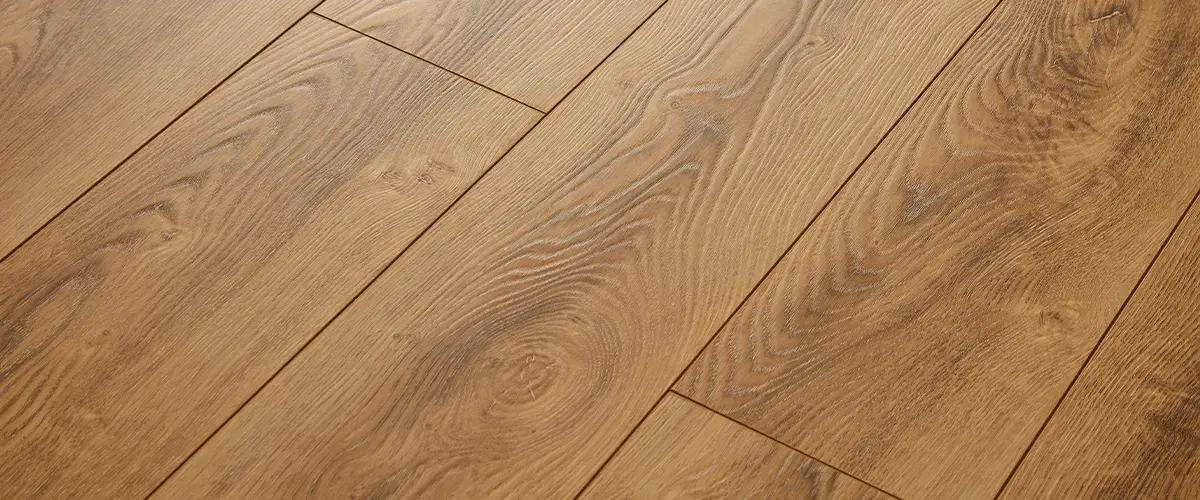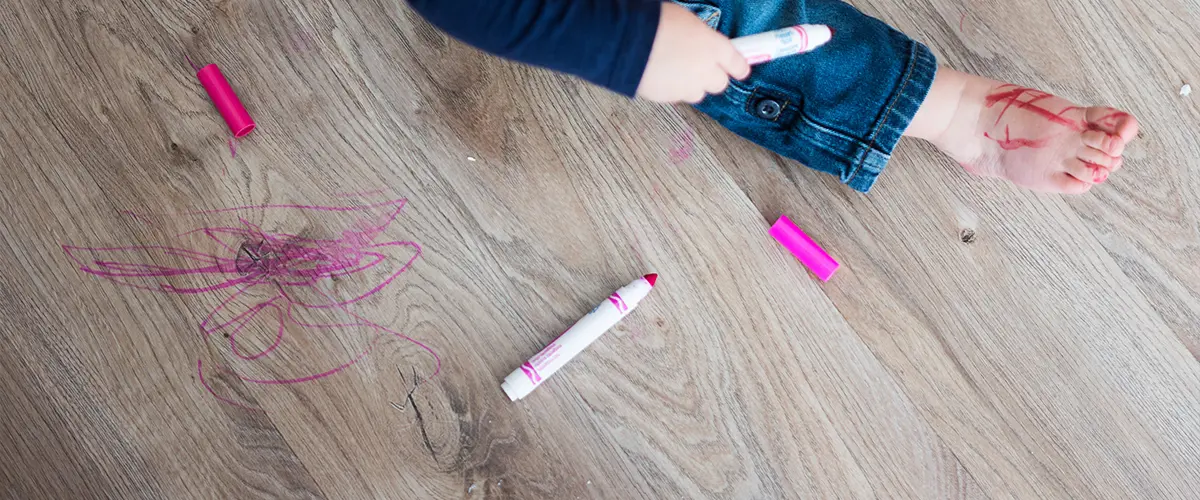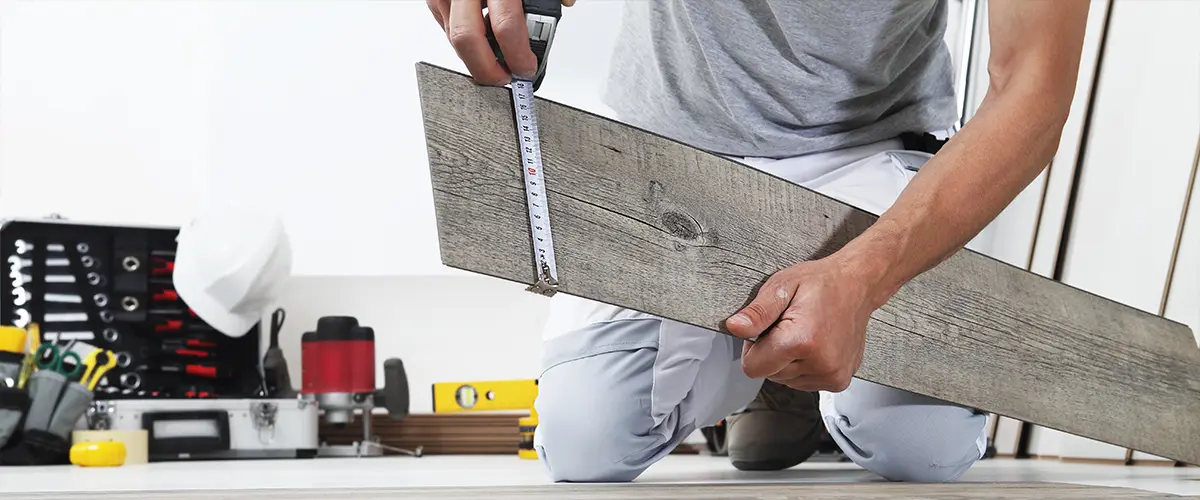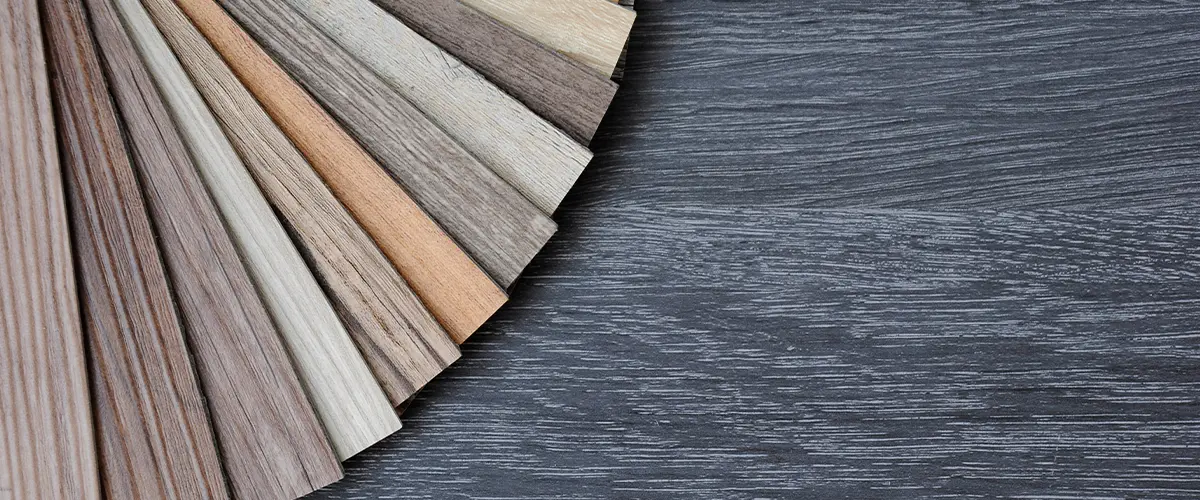When it comes to finding the perfect flooring option for your home, there are numerous battles taking place. For many homeowners looking for a budget-friendly floor, choosing between laminate vs vinyl flooring is the toughest.
Both options offer durability, style, and easy installation that appeal to many of our clients here at KHB Flooring.
So, how do you choose which one is right for you?
In this blog post, we’ll dive deep into the key differences between these two popular flooring types and help you choose the right one for your particular needs.

Key Takeaways
- Laminate and vinyl flooring are both popular, affordable options for homeowners seeking a hardwood alternative without breaking the bank.
- Both laminate and luxury vinyl planks mimic the appearance of natural materials such as hardwood or stone.
- Luxury vinyl planks are more durable due to their thicker surface coatings and better water resistance properties.
- The cost, maintenance, moisture resistance, scratch resistance, and ease of installation vary between these two synthetic flooring types.
- Ultimately, choosing between laminate vs. vinyl flooring comes down to personal preference and intended room use.
Laminate Vs Vinyl Flooring Composition
Laminate Composition
Understanding the composition of laminate and vinyl flooring is essential for homeowners when deciding which option best suits their needs.
Laminate flooring consists of a fiberboard core, typically made from high-density wood fibers compressed with resin. This provides stability and durability to the floor.
The top layer features a scratch-resistant plastic design that mimics the appearance of various natural materials such as hardwood or stone.
Vinyl Composition
On the other hand, luxury vinyl plank flooring or flooring offers similar aesthetic versatility but differs in its construction. Luxury vinyl planks or tiles are composed of several layers, including polyvinyl chloride (PVC) – a form of plastic – combined with additives for flexibility and strength.
Vinyl floors often provide better water resistance compared to laminate due to their impermeable nature, making them suitable for areas like kitchens and bathrooms where moisture is prevalent.
In summary, while both laminate and vinyl offer customizable styles at an affordable price point, it’s crucial to consider factors such as water resistance and lifespan before finalizing your choice between these two popular types of synthetic flooring solutions
Pros And Cons Of Laminate Vs Vinyl Flooring
Let’s look at the pros and cons of each option and help you decide which will be a better match for your home.
Cost
Laminate and vinyl flooring are both popular options among homeowners seeking affordable, durable alternatives to hardwood or tile flooring.
The cost of both laminate and vinyl flooring cost typically ranges from $1 to $6 per square foot, making it an incredible affordable choice for most homeowners.
When comparing the costs of these two synthetic flooring types, it’s essential to factor in the installation and maintenance requirements as well.
For example, while laminate floors may be more affordable initially, they tend to have a shorter lifespan compared to their luxury vinyl plank counterparts.
Maintenance
Laminate and vinyl flooring are both known for their easy maintenance, making them popular choices among homeowners looking for a hassle-free option.
For laminate floors, regular sweeping or vacuuming is essential to remove dirt and debris that may scratch the wear-and-tear-resistant surface. A slightly damp microfiber mop can be used periodically for additional upkeep. Avoid excessive moisture during cleaning as water exposure may damage the fiberboard core.
On the other hand, vinyl flooring boasts an impressive water resistance property, enabling homeowners not only to sweep or vacuum but also use wet mopping with mild cleaners without any issue.
This waterproof feature makes the luxury vinyl tile an ideal choice for kitchen flooring where spills are inevitable occurrences.

Moisture Resistance
Vinyl flooring is the clear winner when it comes to moisture resistance. It’s impervious to water, making it ideal for rooms like bathrooms and laundry rooms where spills are common.
Even if your pipes burst or you experience a flood, vinyl floors will not warp or buckle. Laminate, on the other hand, can be damaged by standing water and humidity over time.
It’s important to note that even though your vinyl plank flooring is waterproof, it’s still possible for mold and bacteria to grow beneath the planks if there’s excess moisture present in your subfloor.
Note: Luxury vinyl plank flooring has more seams, making them more susceptible to water damage. Vinyl sheets, on the other hand, are much more resistant to water.
Durability
When it comes to durability, both laminate and vinyl flooring are excellent choices. They are known for their ability to withstand wear and tear, making them ideal for high-traffic areas in your home.
Laminate is made up of multiple layers that make it incredibly strong and durable. The top layer is a clear protective coating that resists scratches, stains, and fading over time. Vinyl floors have even thicker surface coatings than makes them more scratch-resistant than most laminate floors.
Luxury vinyl options can last anywhere from 10-20 years with proper maintenance.

Installation
One of the major benefits of both laminate and vinyl flooring is that they are incredibly easy to install. Both the vinyl vs laminate options come with interlocking or adhesive features that make installation a breeze, even for those who don’t have much DIY experience.
For example, vinyl planks often come with self-adhesive backs that eliminate the need for additional glue and tools during installation.
On the other hand, laminate boards usually require locking mechanisms to snap pieces together without leaving any gaps. This type of installation method makes it easier to replace individual boards if necessary without having to remove the entire floor covering.
How To Choose Between Laminate Vs Vinyl Flooring
When choosing between laminate and vinyl flooring, it’s important to consider your budget and the intended usage of the room.
Vinyl is generally less expensive than laminate, making it a great choice for those on a budget. It’s also a better overall choice for rooms that see water spills, like kitchens or baths.
Laminate works poorly in baths and kitchens simply because it’s not waterproof.
Ultimately, when deciding between these two types of synthetic flooring options, make sure to evaluate your needs and what characteristics matter most for your space.

Conclusion
After comparing all vinyl vs laminate flooring and vinyl flooring, it is clear that both options have their own set of benefits and drawbacks. While they may look similar, the composition and features of each flooring type differ in important ways.
Laminate floors are an excellent choice if you want a hardwood alternative that is affordable, easy to install, and durable – perfect for a living space or a bedroom.
Vinyl floors offer better protection against water damage. These floors are resilient, scratch-resistant, and provide tremendous value for your money, ideal for a kitchen, mudroom, or laundry room.
If you want to find out more about which flooring option is best for your particular needs, get in touch with our pros from KHB Flooring today! Call us at (209) 487-9663 or request your free quote here!
FAQ
While both types of flooring can be installed by DIYers with some experience, hiring a professional installer might ensure proper installation techniques are used for your floor’s specific needs. Additionally – certain warranties could also require expert level installations in order to remain valid so it’s key consider this factor before getting started if long term protection/quality control matters most!
